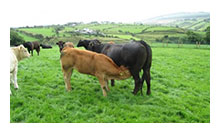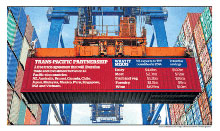 Dear GRSB Member, Dear GRSB Member,
It has been a busy couple of weeks in the beef world – not just for GRSB, though of course preparing for the General Assembly, attending our meeting in Saskatoon and Anuga in Germany certainly made it feel that we and our members are getting things done.
Zandbergen launched the first 100% Rainforest Alliance certified beef burger in Europe (see story below) and McDonalds joined in the American Business Act on climate pledge (see press release). We also welcome WAP as the latest new member of GRSB.
CRSB launched Canadian Indicators at their General Assembly in Saskatoon and our own technical working group met there as well to discuss Global indicators and Accreditation. We look forward to meeting many of you in Amsterdam next week, and for those not able to attend we will have supporting documents to you by the end of this week.
Thanks,
Ruaraidh Petre
Global Roundtable for Sustainable Beef
Executive Director
Sustainability News
This highlights the progress we have yet to make in demonstrating change, but see the article below giving some positive news from Brazil with respect to intensification there. GRSB's position has always been that it is not certification that drives change, and that typically certification schemes only a small percentage of an industry. What we want to see is impact on the average, and particularly the lowest performers, as it is by closing that efficiency gap we can have the most impact. A system to measure that impact is essential for us to demonstrate our case.
Dateline: 10/08/15, Source: Eco–Business
There isn't any global certification for cattle, according to the report and the Global Roundtable for Sustainable Beef is barely two years old. Jeff Hayward, the Director of the Rainforest Alliance's Climate Program, agreed that a tangible and established standard can help foster commitment, but he wondered why there wasn't more and faster uptake with the other commodities the way there was with palm oil.
He noted that the Sustainable Agriculture Network has a standard for cattle, there just isn't a lot of activity around it. Though Hayward did acknowledge that, while each commodity value chain is complex, the cattle chain is particularly complicated.
GTPS is working with GoB funds to restore degraded pasturelands. The impact in reducing pressure on forests, increasing productivity and storing carbon in the soil are significant – it's important that we capture the figures involved.
Dateline: 10/07/15, Source: Drovers CattleNetwork
The livestock industry in Brazil has grown sustainably and is one of highest contributing sectors to the national trade balance. Thanks to productivity gains over the period 1990–2014 – from 1.6 to 4.0 @/ha/year, the total area occupied by pasture was reduced from 188.3 million to 167 million hectares, despite the increase in beef production and exports. Today, 19.2% of Brazil's national territory is occupied by productive pastures.
Dateline: 10/12/15, Source: By Jon Condon, BEEF Central:
Teys Australia is embarking on an historic move designed to reward producers for the meat yield their cattle produce, as well as their quality. The company shared details of its vision to move to Value–Based–Payment system with suppliers at a field day on Friday. There can be $80 differences in value from one carcase to another, based solely on meat yield, producers have been told.
Contrasting with price doldrums in the US, the Australian industry has seen high prices due to a 20 year low in inventory – convincing consumers to pay those prices is a challenge, but essential for economic viability.
Dateline: 10/12/15, Source: ABC News AU
Beef producers have told industry groups at a summit in central Queensland that they want to focus on convincing consumers to pay more for their meat and getting better value from levies.
Dateline: 10/06/15, Source: Farming UK
With one in seven humans undernourished and with the challenges of population growth and climate change, the need for efficient food production has never been greater. The University of Bristol will host an international conference to discuss this issue early next year [12–15 January 2016].
The University has been instrumental in establishing an international programme on sustainable ruminant production, contributing to food security, sustainability and poverty alleviation called the Global Farm Platform.
Members in the News
The valuable point made here by Jeffrey Fitzpatrick–Stillwell is that sustainability really needs to be kept in the pre–competitive sphere if it is going to become industry wide and consistent. There are lots of ways to differentiate product, but let's ensure that all systems are aiming to be environmentally sound, socially responsible and economically viable.
Dateline: 10/13/15, Source: By Shannon VanRaes, Manitoba Co–Operator
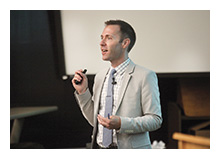 When it comes to sustainability, competition isn't the name of the game. Speaking at the University of Manitoba during a seminar hosted by the National Centre for Livestock and the Environment, Jeffrey Fitzpatrick–Stilwell of McDonald's Canada said that efforts to make food production more sustainable need to be "pre–competitive." When it comes to sustainability, competition isn't the name of the game. Speaking at the University of Manitoba during a seminar hosted by the National Centre for Livestock and the Environment, Jeffrey Fitzpatrick–Stilwell of McDonald's Canada said that efforts to make food production more sustainable need to be "pre–competitive."
"We work very collaboratively, not only with our supply chain, but also with our competitors," explained Fitzpatrick–Stilwell, senior manager of sustainability for the company. "I talk to Tim Hortons, to Starbucks, talk to Burger King, we talk to Wendy's, we talk to everyone, sharing best practices in the sustainability sphere."
Dateline: 10/13/15, Source: By Bryan Thompson, KCUR
Climate change is real and must be addressed head–on to prevent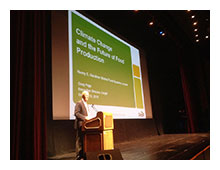 future food shortages. That's the message Cargill Executive Director Greg Page delivered Monday night to an audience at Kansas State University in Manhattan. future food shortages. That's the message Cargill Executive Director Greg Page delivered Monday night to an audience at Kansas State University in Manhattan.
"Climate change is not a particularly popular subject in much of the heartland," he said. "But at Cargill, we have come to believe that it is important to have serious conversations about what we can do now to accommodate a range of climate scenarios, and for agriculture to take part in those conversations and in making reasonable preparations."
Dateline: 10/15/15, Source: By Alesi Kienlen, Manitoba Co–Operator
McDonald's Canada will reach its goal of selling "verified sustainable" beef next year, says the company's senior manager of sustainability. "We're right on track as far as we know — it's hard to know how many producers we'll be able to get interested and get through, but we've got some pretty good numbers now," said Jeffrey Fitzpatrick–Stilwell. As of last month, 147 operations had signed up for the verification process, and 35 will complete it by the end of this month.
Dateline: 10/15/15, Source: Frozen Foods Biz
The first Rainforest Alliance–certified frozen beef product in the European market was launched at the Anuga food fair in Cologne, Germany, which concluded on October 14 after a successful five–day run. Distributed under The Frozen Butcher name, a brand of Zoeterwoude, Holland–based Zandbergen World's Finest Meat, packaging for the frozen burger bears the iconic frog seal. The meat treat is 100% Brazilian beef sourced from Rainforest Alliance–certified farms.
Dateline: 10/10/15, Source: Jamestown Sun
Firefighters in Brazil's Amazonian region are teaching indigenous groups how to protect their communities from forest fires while also sustainably cultivating their lands without causing excessive damage to the rainforest.
Since 2009, the United States Forest Service has been providing training and support for the Alianca Brigade, part of the Alianca da Terra (Land Alliance) NGO, a land–owner, conservation, non–profit group that works in part to protect Brazil's Amazon forest.
Volunteers from the Alianca Brigade, in turn, are teaching members of different Amazonian indigenous groups how they can better protect their communities from brush fires.
Dateline: 10/15/15, Source: Canadian Roundtable for Sustainable Beef News Release
The Canadian Roundtable for Sustainable Beef (CRSB) held its Annual General Meeting (AGM) on September 30th, 2015 in Saskatoon, SK. The meeting brought together over 55 organizations representing all aspects of the Canadian beef value chain to celebrate this year's accomplishments and plan for the upcoming year. Topics included updates on the sustainability benchmarking study, business strategy, indicator development and upcoming verification work. Participants also had the opportunity to tour Pound–‐Maker Agventures Ltd., Blair's Family of Companies and the Western Beef Development Centre's Termuende Research Ranch, where they learned about some of the sustainability initiatives taking place in Saskatchewan.
Dateline: 10/19/15 Source: McDonald's News Release
Today, McDonald's joined the White House American Business Act on Climate Pledge, bringing together sustainability goals from across the McDonald's System in support of a low–carbon, sustainable future.
McDonald's pledge outlines our continued commitment to managing our carbon footprint. Working with our suppliers, we aim to eliminate deforestation and to support sustainable beef, palm oil, fiber for packaging and coffee. In collaboration with McDonald's independent franchisees, we're striving to reduce the carbon footprint of restaurant operations by enhancing energy efficiency, enabling renewable energy sourcing, minimizing waste and increasing recycling in McDonald's restaurants.
Our Members
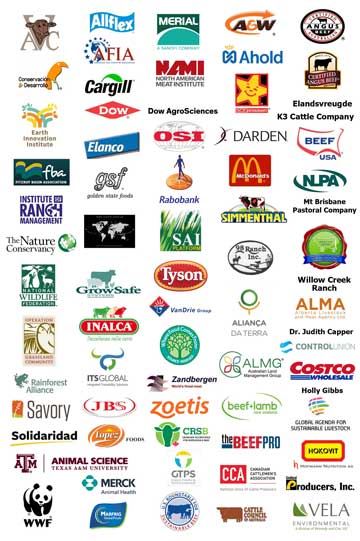
|
To read the entire source article, click on the link in the headline.
Welcome to the Table!
We Welcome The Newest Member to the Roundtable
Dateline: October 2015
Constituency: Civil Society
World Animal Protection is a global animal welfare organization, active in more than 50 countries. From offices around the world, they work with local partners, businesses and governments to help people find practical ways to improve animal welfare worldwide.
They collaborate with national governments and the United Nations (UN) and have formal relationships with international bodies including the UN Food and Agriculture Organization, the United Nations Environment Programme and the International Federation of Red Cross and Red Crescent Societies.
World Animal Protection is the only animal welfare organization with a memorandum of understanding with the World Organization for Animal Health.
They undertake both practical projects on the ground and advocacy to promote animal welfare at policy and corporate level. Sustainable livestock production is a strategic priority activity of the organization. World Animal Protection is a member of the guiding strategic group of the FAO–led Global Agenda for Sustainable Livestock and works extensively with food industry producers and other corporates to improve farm animal welfare.
Global News
Ecological intensification has become a popular term of late; here is a study with evidence (from a limited sample) that enhancing the habitat for pollinators on field margins is compatible with and can even positively impact crop yields:
Dateline: 09/03/15, Source: The Royal Society
Ecological intensification has been promoted as a means to achieve environmentally sustainable increases in crop yields by enhancing ecosystem functions that regulate and support production. There is, however, little direct evidence of yield benefits from ecological intensification on commercial farms growing globally important foodstuffs (grains, oilseeds and pulses).
It may sound trite, but if we don't look after our soils, we will not be able to feed the planet. Soil loss, and declining soil fertility are both problems on a massive scale across the globe, and need to be a focus for any agricultural sustainability initiative.
Source: Science Magazine
The future of humanity is  intertwined with the future of Earth's soil resources. Soil provides for agriculture, improves water quality, and buffers greenhouse gases in the atmosphere. Yet human activities, including agricultural soil erosion, are rapidly degrading soil faster than it is naturally replenished. At this rate, human security over the next century will be severely threatened by unsustainable soil management practices. Amundson et al. review recent advances in understanding global soil resources, including how carbon stored in soil responds to anthropogenic warming. Translating this knowledge into practice is the biggest challenge remaining. intertwined with the future of Earth's soil resources. Soil provides for agriculture, improves water quality, and buffers greenhouse gases in the atmosphere. Yet human activities, including agricultural soil erosion, are rapidly degrading soil faster than it is naturally replenished. At this rate, human security over the next century will be severely threatened by unsustainable soil management practices. Amundson et al. review recent advances in understanding global soil resources, including how carbon stored in soil responds to anthropogenic warming. Translating this knowledge into practice is the biggest challenge remaining.
And here are some practical real world examples of what people do to look after soils on their farms and ranches.
Dateline: 10/13/15, Source: By Alan Newport, Drovers CattleNetwork
Cover crops for grazing can be as successful or as futile as your management makes them. Darin Williams uses mostly multi–species cover crops for soil–building, and he plans, plants and stockpiles forages to get through the fall slump, the cold of winter and that difficult early–spring period before perennial grass greens up.
Dateline: 10/06/15, Source: By Ciaran Moran, AgriLand
One of the key recommendations arising out of the Food Harvest 2020 report was for Teagasc to set up a stand–alone demonstration herd in the west of Ireland.
It was felt that a demonstration farm was needed in the west in order to demonstrate to farmers the key technologies that drive profitability in a suckler herd. At the recent National Beef Conference, Teagasc's Adam Woods outlined how the new farm would operate and what its objectives were..
Dateline: 10/05/15, Source: By Alexis Kienlen, Alberta Farmer
"There are benefits in grassland biodiversity and healthier air and water and land systems — but there isn't a lot of societal support to improve these things," said Tim Smith, who runs a 750–head Angus cow–calf operation and custom forage harvest business.
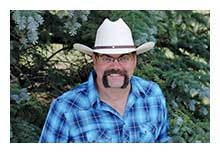
In the coming year, Smith will be travelling the world to find out what's being done elsewhere and what can be done here after being selected as one of three Canadian Nuffield scholars for 2016.
"I saw the opportunity to apply for a travel–and–learn scholarship and thought it was a great opportunity for a mid–career rancher," said the 46–year–old, who is an Alberta Beef Producers delegate and a Canadian Cattlemen's Association director.
Dateline: 10/06/15, Source: The Cattle Site
A supply deal with China and a pending treaty with the US could be a major boost to the Namibian beef industry. The government in Namibia has been urged to enhance disease control in the cattle farming industry to help open up more export markets. The growing export market for beef products was likely to "benefit many of our emerging farmers within the supply chain," according to Professor Peter Katjavivi, patron of the Ongombe farmers association and also speaker of the national assembly in the country.
Dateline: 10/06/15, Source: By Xavier La Canna, ABC News, AU
Beef and cattle producers are happy with the outcome of the Trans–Pacific Partnership (TPP) trade deal but Top End mango farmers say it probably will not make a big difference to them.
"I really think that the TPP that has been completed over the weekend is great for the whole of Australia's beef industry, and that will also then have positive flow–on impacts to northern beef producers, who will have their markets linked through to more markets globally for beef," Consolidated Pastoral Company (CPC) chief executive Troy Setter said.
Dateline: 10/07/15, Source: NZ Herald
While the agreement was less than ideal for dairy, it did favour several other primary sector heavy hitters such as meat and horticulture.
Beef and Lamb New Zealand and the Meat Industry Association (MIA) said the best possible deal for sheep and beef farmers was secured. "The TPP will have a significant impact on the competitiveness of our exports in TPP markets," Beef and Lamb chairman James Parsons said. The sheep and beef sector's exports to TPP countries were worth more than $2.4 billion in 2014, nearly one–third of the sector's total exports. That trade incurred about $94 million in tariffs last year.
News We Can Use
If you have news to share with the Global Roundtable for Sustainable Beef membership, please send it to polly.welden@grsbeef.org
|


